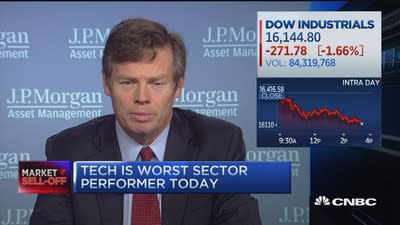Fed to raise, but a recession is unlikely: Econ

Fears of recession and the uncertainty of the Fed raising interest rates, amid new U.S. employment data, drove stocks lower on Friday.
The unemployment rate came in at 4.9 percent down from 5.0 percent, while wages rose 0.5 percent. The U.S. economy added 151,000 jobs in January, according to the Bureau of Labor Statistics. Economists, however, were expecting a gain of 190,000.
Despite a disappointing jobs report, a lower unemployment rate has led the Street to believe that more rate increases are still in play. This comes after the Federal Open Market Committee held the line in January. A number of economists responding to a CNBC Fed Survey said they saw the next rate hike in May, rather than March.
That may, however, no longer be the case as investors consider more rates will be factored in sooner than later.
"Do we still see enough job growth to put downward pressure on the unemployment rate?" Jeffrey Cleveland, chief economist at Payden & Rygel, asked CNBC's "Closing Bell." "The answer is yes," he said adding that if this continues to be the case, the Fed is still in play.
The fear of rate increases have been coupled with weak U.S. economic data and falling oil prices, driving investors to believe there's an impending recession.
Cleveland disagrees and argues that while the ISM manufacturing was sub-50, which some think is an indicator of a manufacturing recession, his firm thinks the data will turn for the better.
"The folks using the r-word will have to put that out of their vocabulary," he said.
In that same vein, David Kelly, chief global strategist at JPMorgan Funds, said that the market is misunderstanding the economics.
Kelly considers that while the market looks volatile and "irrational" day-to-day, watching for risk indicators of a global or U.S. recession is key.
Nonetheless, the strategist suggests that market watchers to look at the first quarter results.
"If it doesn't mean a recession and earnings bounce back, which they will, then this market is cheap," he said to CNBC's " Closing Bell ."
Jim Caron, portfolio manager for global fixed income assets at Morgan Stanley, told CNBC that he views Friday's data as an "encouraging sign."
"Today's payroll report was somewhat positive," he said. "Unemployment rate 4.9 percent, average work week up, average hourly earning — incomes are growing a little bit, all these things are a good things."
— CNBC's Fred Imbert contributed to this report.
More From CNBC
Top News and Analysis
Latest News Video
Personal Finance

 Yahoo Finance
Yahoo Finance 
